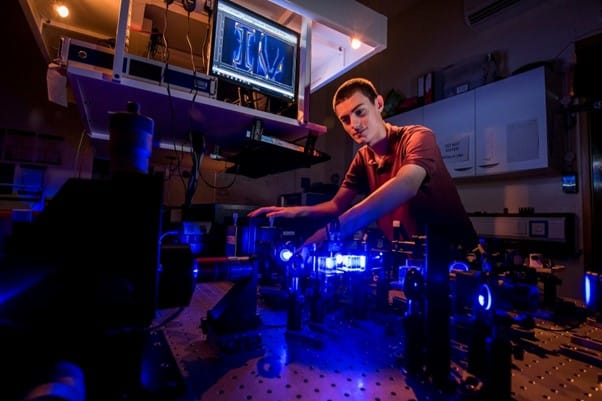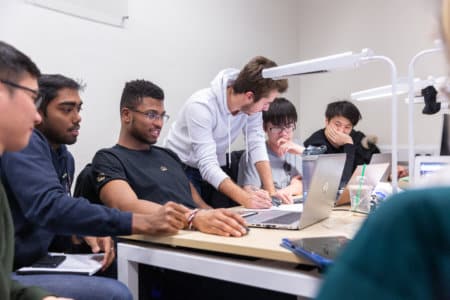
For some, joining the ranks of legendary physicists like Marie Curie, Albert Einstein and Richard Feynman is the dream. The question is: how do you get there? If you’re a fan of the American television show “Big Bang Theory,” you might believe that the only way to climb to answer some of the biggest questions about the universe is to attend the California Institute of Technology and have wild adventures with your closest friends, before finally making a breakthrough with your research.
While this might be a plausible scenario, other pathways can help you achieve this goal — and they promise journeys just as exciting. The first step is to find a school with an exemplary physics department. It would feature expert faculty members, state-of-the-art laboratories and resources, lots of research opportunities, small classes and a challenging curriculum covering theoretical and experimental aspects. Graduates often thrive within and beyond science, including finance, as well as the software, computing and consultancy industries.
Below are universities with physics departments that boast successful track records of transforming students into career-ready graduates and leading scientists:

Southampton’s School of Physics and Astronomy is 59th globally and seventh in the UK in the QS world rankings for Physics and Astronomy (2023). Source: University of Southampton
University of Southampton
The University of Southampton is a global top 100 university. Other than its impressive academic record, the institution is ideally situated in the friendly and idyllic coastal city of Southampton only about one hour south-west of London and neighbouring the New Forest National Park. Its School of Physics and Astronomy is 59th globally and seventh in the UK in the QS World University Rankings for Physics and Astronomy 2023.
What earned the school these impressive accolades is its dedication to cutting-edge research, which is rated world-leading or internationally excellent for its impact on society. “The best way to describe studying here would be to say it is engaging,” says Sai Pandian, a BSc Physics graduate. “You never feel as though you have been left alone to learn something, lecturers and staff are always ready to support you and guide you in your studies.” He is currently a senior data scientist at John Lewis Partnership.
As third in the UK for graduate career prospects, according to the Guardian University Guide 2022, the School of Physics and Astronomy is the ideal choice for a budding physicist. In fact, 93% of physics graduates land employment or go on to further study after 15 months of earning their Southampton qualification. The department offers 5,000 pounds annual support through scholarships, which aims to aid well-qualified students to study Physics and Astronomy here, and to build greater inclusivity in our academic community. There are 10 scholarships available, five of which are purely merit-based and the rest are for applicants who meet widening participation criteria on top of being excellent prospective students.
Students have an expansive array of exciting degree programmes to choose from. Aside from the general BSc Physics and a variety of MPhys Physics options (including Mathematics, Astronomy and Space Science), the school also offers a Physics with Quantum Science and Technologies (MPhys). If exploring quantum computing and telecommunication to gravity sensors is the future you envision, this programme is surely for you.
What makes it unique is that this is one of only two such offerings in the country that will make the students fit in a future-proof technology at the cutting edge of university and industrial research. In terms of the school’s flagship programmes, students have the option to participate in a final year devoted to research in the UK, at CERN in Switzerland or at the Harvard-Smithsonian Centre for Astrophysics in Boston.

Cardiff University offers six research-led master’s programmes. Source: Cardiff University
Cardiff University
Studying at Cardiff University School of Physics and Astronomy brings you closer to the forefront of research and innovation. Ranked second in the UK for research impact and located in the capital city of Wales, Cardiff is a Russell Group institution in the top 25 universities in the UK. Exciting scientific discoveries are made here, as are inspired students and staff.
Cardiff University Physics offers six, research-led master’s programmes: Physics, Astrophysics, Data Intensive Physics, Data Intensive Astrophysics, Compound Semiconductor Physics, and Gravitational Wave Physics. Each includes a project designed to mirror research groups, with support from academic staff and postgrad researchers. With access to an outstanding array of facilities, you will learn in a friendly, collaborative environment.
All programmes cover theoretical, observational, and experimental techniques across a wide variety of areas and combine data analysis and computational techniques with the core science disciplines. These include fundamental physics (theoretical and experimental) and range from the physics of nanoscale devices to the cosmos, on scales from planets to the whole universe. You will be taught by members of internationally-leading research groups including the Institute for Compound Semiconductors; the Gravity Exploration Institute, one of the largest gravitational wave research groups in the world; and the Cardiff Hub for Astrophysics Research and Technology, one of the largest groups of astronomers in the UK.
Each programme is designed to equip you with the skills and knowledge needed for a range of careers from academic research to technical, development and engineering roles in related scientific fields. All programmes welcome applications from a broad range of backgrounds, including engineering, computer science or maths, provided you have sufficient experience with core concepts such as maths and coding.

University of Edinburgh’s School of Physics and Astronomy is ranked fourth in the UK and first in Scotland in the Research Excellence Framework. Source: University of Edinburgh
University of Edinburgh
Formed in 1993 by the merger of the Department of Physics (called the Department of Natural Philosophy until the late 1960s) and the Department of Astronomy, the University of Edinburgh‘s School of Physics and Astronomy is ranked fourth in the UK and first in Scotland in the Research Excellence Framework (REF) 2021 listing by Times Higher Education. Its numerous degree programmes are accredited by the Institute of Physics and the Royal Society of Chemistry. It boasts 260 members of staff, 80 of whom are teachers.
The school’s academic and research staff belong to research institutes such as the Institute for Astronomy (IfA), Institute for Condensed Matter and Complex Systems (ICMCS), and Institute for Particle and Nuclear Physics (IPNP). The university also hosts multidisciplinary research centres, namely the Centre for Science at Extreme Conditions (CSEC), Higgs Centre for Theoretical Physics, Tait Institute for Mathematical Physics, UK Centre for Astrobiology, and Centre for Exoplanet Science.
The school’s learning and teaching methods focus on peer learning. Some practices include peer instruction; flipped classrooms, where students study material in advance so lecturers can focus on complex topics; student-generated content, Peerwise, which enables authors to create their own assessment questions on the content of the course; and Physics Education Research group, which tests and examines the effectiveness of instructional techniques.
Programmes offered here include physics, astrophysics, computational physics, mathematical physics, physics with meteorology, physics with a year abroad, and theoretical physics. There are one-year taught master’s degrees in theoretical physics, mathematical physics, particle and nuclear physics, astrobiology and planetary sciences, as well as fully-funded PhDs.
*Some of the institutions featured in this article are commercial partners of Study International








